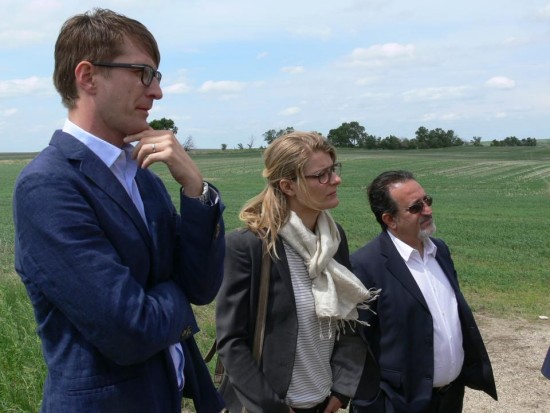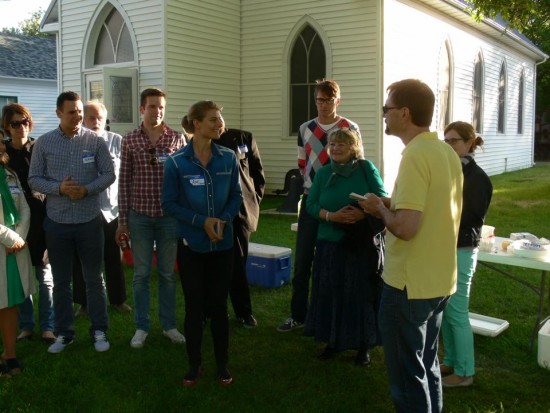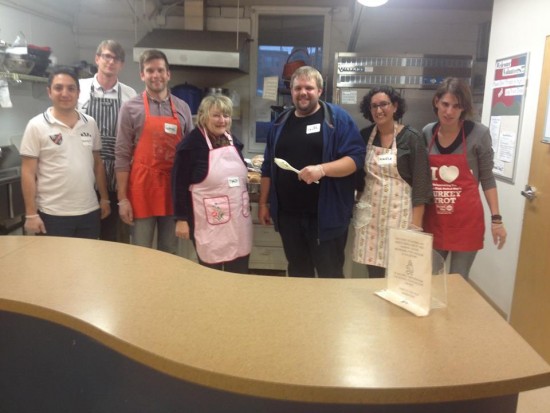If you’re looking for a place to partake meaningful dialogue with Europeans leaders, you might want to try North Dakota. Earlier this summer, 15 young European leaders and professionals mingled with local residents in the small, but growing, town of Minot, North Dakota.
The European visitors participated in a United States Department of State International Visitor Leadership Program (IVLP) project, administered by Meridian International Center. The purpose of the project was for these young leaders to witness and converse about current political, social, and economic issues in the United States. and similar issues faced by their home countries.
Why North Dakota? The topic that brought these visiting foreigners to one of the United States’ least populated regions is quickly rising to the forefront of political discussion both in the United States and in Europe: fracking. This relatively new drilling method is allowing for the extraction of previously difficult to reach natural gas and shale reserves deep underground, and the leading technologies for this process can be found in towns across North Dakota. An enormous deposit of shale-oil under the state has led to some of the fastest growth ever seen by these rural towns and cities.
Fracking has been catching a lot of flak in the media though, especially from environmentalists and others concerned with the possible health risks it can bring about. Critics are particularly concerned with contaminated drinking water and pollution as a result of the mining.

Now Europe is pondering the idea of using fracking techniques on its own shale reserves. Large basins of shale gas have been found under both Denmark and Poland, both of which are home to some of the visitors to Minot. There are still plenty of opponents of fracking in Europe, and countries there are still studying the United States for the most part before moving forward themselves. A tempting argument for allowing the mining method though is the decreased energy dependence on Russia for the rest of the continent, especially as international tensions have grown in the past several months.
The European visitors did more than just study fracking policies and techniques though. They mixed with Minot locals at a potluck dinner held at the Pioneer Village North Dakota Fair Grounds. There they received a taste of home hospitality as they sat down for dinner with American families. The event was even covered by the local news and one visitor from Germany was recognized in a drug store for his TV appearance the next day.

Minot and fracking were not the only items on the visitors’ agenda. The European politicians traveled to eight U.S. cities altogether and discussed a wide range of topics while exploring American political diversity. One of the first subjects covered upon their arrival in Washington at the beginning of the program was U.S. federalism and how it shapes all political activities. The visitors were interested in how the state governments in the United States hold so much of their own power, a core tenant of the U.S. federal system. They were able to compare and contrast the U.S. system with their own respective governments at home as well as the structure of the European Union (EU) before setting off on their city-hopping tour of the United States.

Another hot issue for both the U.S. and Europe is immigration. The visitors were keen to ask about the current child immigration crisis occurring in the United States, where tens of thousands of unaccompanied minors from Central American countries have been crossing over the U.S. border. In Washington, immigration reform was a main topic of discussion and was picked up again later in the program when the visitors met with Mayor Greg Stanton of Phoenix Arizona. The mayor discussed passing of the highly controversial Arizona Law SB1070, the purpose of which is to make it more difficult for immigrants to stay in Arizona, and his own support for immigration reform in the 46% Hispanic city.

In Europe, specifically the EU, immigration is also becoming an important election issue. Rules for member countries of the EU make it very easy and simple for citizens of one member nation to obtain a visa for another member nation. This also includes the right of visa holders to claim the same benefits as citizens of the nation they reside in. The most notably irritated EU member over this policy is the UK, where Prime Minister David Cameron recently imposed higher restrictions on benefits that can be claimed by foreign job seekers. On the other hand, Germany has been dubbed a new “land of opportunity” for its relative openness to immigrating European workers, which are crucial to maintaining the strength of its economy.
But again, the visitors came to the United States to do more than study policies. During their time out West the visitors sat down in American homes for some home-cooked meals. The group broke into smaller teams and visited the cities of Reno, Nevada, Denver, Colorado and Salt Lake City, Utah. In each of those cities, the visitors had dinner with American families and participated in volunteer projects. In Denver, the visitors served meals at a homeless shelter for women, where they spoke with the women and learned the “hard and true stories behind each of them.”

During their three weeks in the United States, the visitors discussed many other important topics from student debt, to rising sea levels, to new international trade agreements. More importantly, they discussed these topics with their U.S. counterparts, including everyone from policy makers and politicians to small town residents and social workers. The program ultimately centered around the importance of exchange, as these visitors from over a dozen European countries sat and spoke with Americans from across the nation.
Our neighbors across the Atlantic face many of the same issues that we do in the United States. Exchanging ideas and solutions across borders is crucial in order to solve the world’s largest problems.
















